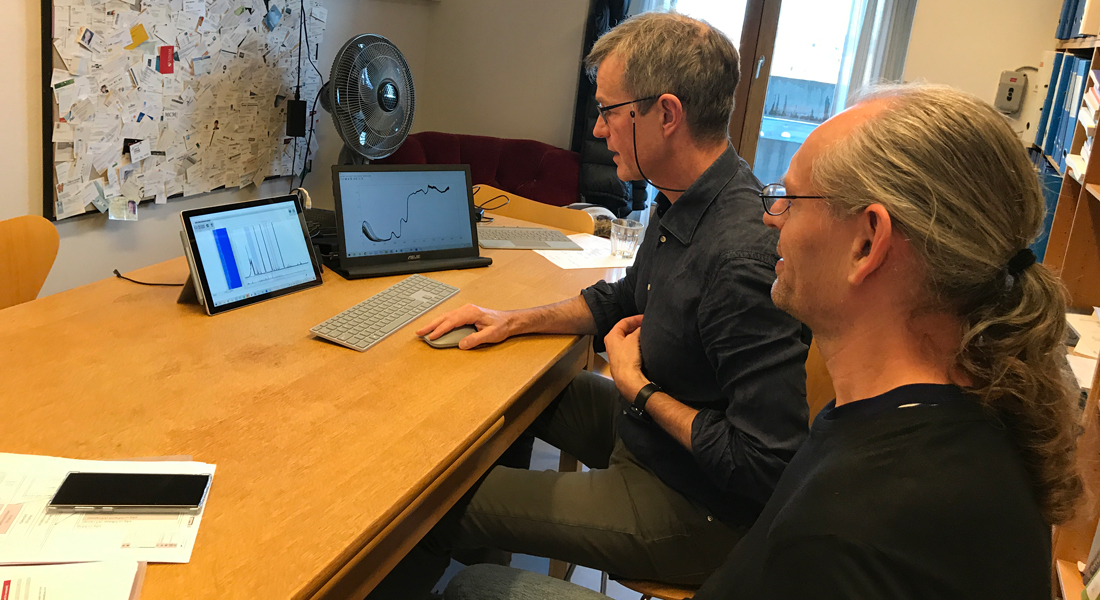Chemometrics and Machine Learning
The Chemometrics and Machine Learning (CML) cross-sectional group at the Department of Food Science at University of Copenhagen (UCPH FOOD) has been doing research on machine learning (ML) and artificial intelligence (AI) for more than 25 years. The application of these tools in the areas of food industry and food chemistry is called chemometrics.

We analyze food samples and get huge amounts of data that can be used for solving complex problems and uncovering new phenomena. The aim is not only predictive performance but also to get a better understanding of the food system, in other words, interpret the results from the data analysis. This understanding will assist engineers and food researchers to explore and comprehend complex biological systems.
At UCPH FOOD, we measure samples from raw materials to end-products. Through data analysis we estimate properties and functionalities from these measurements, enabling us to optimize and characterize food production and end-quality. This is widely applied for raw material identification, process monitoring and optimization, food fraud and adulteration detection, gastronomy, understanding the biology of fermentation flavor research, proteomics, metabolomics and many other areas. (See also the research group Foodomics at UCPH FOOD)
Our research is divided in applied and basic research. We use and develop statistics, artificial intelligence, mathematical optimization and machine learning, combined with knowledge of the physical and chemical nature of the data. In short, chemometrics.
Process monitoring: We work with process analytical technology, quality by design and statistical process chemistry as well as process monitoring to improve, optimize, monitor and ensure the quality in food production. We are directly linked to the section developing dedicated measurement technologies (Food Analytics and Biotechnology).
Metabolomics: We work with metabolomics especially in relation to health, gastronomy and food quality to better understand e.g. physical properties of food, and we are directly linked to the section involved in data collection and experimental designs of metabolomic studies (Food Analytics and Biotechnology).
Spectroscopy: We work with many types of advanced analytical instruments such as near-infrared spectroscopy, fluorescence, nuclear magnetic resonance, chromatography etc. We develop specialized software and algorithms for extracting information from such data; software/algorithms that we freely share at https://ucphchemometrics.com/186-2/algorithms/.
We offer many courses from the beginning of the bachelor to advanced PhD courses, covering all aspects of chemometrics, machine learning, design of experiments, metabolomics, process analytical technology, quality by design and many other subjects.
You can find information regarding the course at kurser.ku.dk, phdcourses.ku.dk and phdcourses.dk.
We collaborate with all fields and facilities at UCPH FOOD.
We have extensive collaboration with food companies in Denmark as well as abroad. Being the largest academic chemometrics group in the world, we also have extensive collaboration across the world. We typically have 5-15 visiting researchers mainly from academia. We collaborate with Plant Environmental Sciences (PLEN), Nutrition Exercise and Sports (NEXS) and other internal University of Copenhagen departments. We also collaborate across the faculties at the University of Copenhagen, with Faculty of Health Science (SUND) being the strongest, and Department of Pharmacy (Pharma) in particular. We also have solid collaborations with different departments at DTU.
Our collaboration with industry is to solve problems or challenges they have that we deem possible to solve through the use of chemometrics. This is often connected with our focus areas, such as process monitoring, metabolomics and, in particular, spectroscopy. To facilitate this, we run intensive one-and two-day courses on chemometrics, design of experiments, spectroscopy etc. targeting industry partners through the ODIN consortium. We also do industry-partnered research programmes and master projects deploying our knowledge, resources and hours on industry-driven problems.
Åsmund Rinnan (head of group)
Rasmus Bro
Morten Arendt Rasmussen
Frans van den Berg
Contact
 Åsmund Rinnan
Åsmund Rinnan
Associate Professor, head of group
aar@food.ku.dk
 Rasmus Bro
Rasmus Bro
Professor
rb@food.ku.dk
 Frans van der Berg
Frans van der Berg
Associate Professor
fb@food.ku.dk
Morten A. Rasmussen
Associate Professor
mortenr@food.ku.dk
